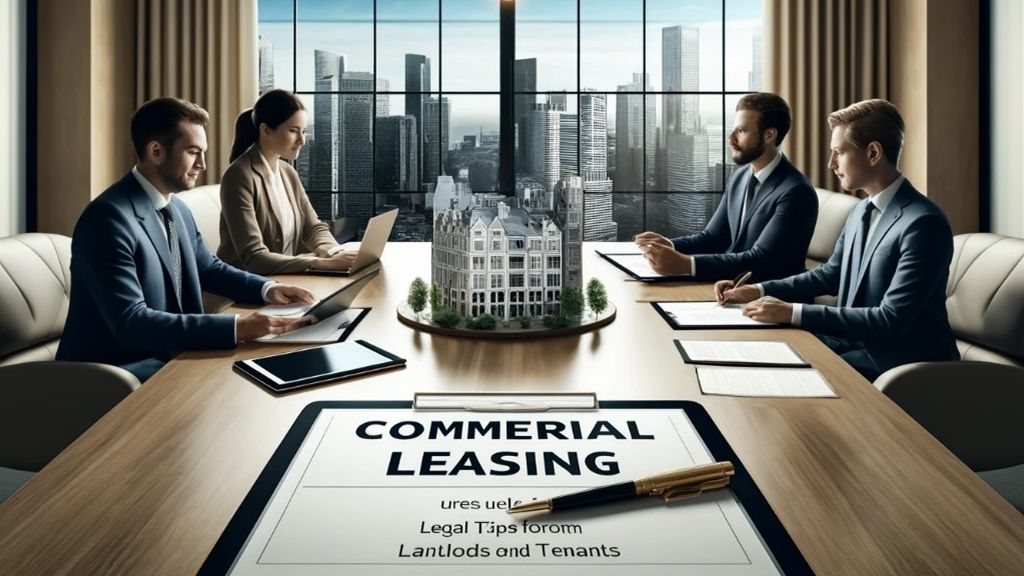Introduction
Commercial leasing involves complex negotiations and detailed contracts that bind landlords and tenants of new property to specific terms for an extended period. Understanding the legal aspects of commercial leases can help both parties avoid disputes and ensure that their interests are protected. This guide offers comprehensive legal tips to navigate commercial leasing effectively, whether you are a landlord looking to lease space on your property or a tenant seeking the perfect commercial office space.

Understanding Commercial Leasing
The commercial leasing market serves as a cornerstone sector of the business property market, providing spaces for retail, office space, industrial, and other commercial activities. Unlike residential leasing, commercial leases offer significant flexibility, allowing landlords and tenants to negotiate terms that best fit their business goals and operational needs.
Overview of Commercial Lease Agreements
Commercial lease agreements are complex documents that establish the terms under which a commercial property is leased. These agreements are tailored to the specific needs of the building, the location, the company, and both parties involved, addressing various aspects of the lease in detail.
Key Components of Commercial Leases
Rent Amount and Adjustments: The lease outlines how rent is calculated, including any provisions for rent increases linked to market conditions or business performance, such as percentage leases in retail.
Lease Duration and Renewal Options: Specify the term of the lease and the conditions under which it may be renewed. This can range from short-term leases of one to two years to long-term agreements lasting several decades.
Termination Conditions: Defines the circumstances under which the lease may be terminated early, which might include breach of contract, bankruptcy, or mutual agreement.
Maintenance Obligations: Clearly delineates responsibilities for maintenance and repairs between the landlord and the tenant, which can vary significantly depending on the type of lease.
Custom Clauses Tailored to Business Needs
Signage Rights: Addresses permissions and restrictions for signage, which is crucial for tenant branding and visibility.
Subletting and Assignment: Terms under which the tenant may sublet the space or assign the lease to another party, often requiring landlord approval.
Alterations and Improvements: Conditions under which tenants can make alterations or improvements to the property and how these are to be managed at the end of the lease.
Types of Commercial Leases

Understanding the advantages of different types of commercial leases can help tenants, investors and landlords identify and create the arrangement that best suits their financial and operational strategies.
Net Lease
Description: In a net lease, the tenant is responsible for a portion or all of the property taxes, insurance, and maintenance costs along with their rent. This type of lease can be further categorized into single, double, and triple net leases, each adding more responsibilities to the tenant.
Suitability: Ideal for tenants who want more control over the management of the property and potentially lower rent payments.
Gross Lease
Description: Under a gross lease, the landlord pays most, if not all, of the property’s operational costs, except for utilities and janitorial services, which are the tenant’s responsibility.
Benefits: Provides tenants with predictable costs, simplifying budgeting and financial management.
Modified Gross Lease
Description: This lease type is a compromise between a net lease and a gross lease. It allows for a more balanced distribution of operating expenses between the tenant and the landlord.
Negotiation Flexibility: Terms can be extensively negotiated to fit the specific needs and projections of both parties, making it a versatile option for many businesses.
Commercial leases are fundamental to the functioning of the business world, offering varied and customizable terms to suit diverse business needs. Whether you are a landlord or a tenant, understanding the intricacies of different types of leases and the specific terms of your contract can significantly impact your business operations and financial health. Engaging with knowledgeable commercial real estate industry professionals, such as lawyers and brokers, can provide valuable guidance in navigating this complex field.
Legal Considerations for Landlords and Tenants in Commercial Leasing

Navigating the legal landscape of land and commercial leasing requires both landlords and tenants to understand and address a range of legal considerations. This ensures that land and agreements are not only compliant with the law but also structured in a way that protects both parties’ interests throughout the lease term.
Legal Considerations for Landlords
Landlords must approach investment and commercial leasing with a meticulous legal strategy to protect their property and capital investment while ensuring their property management and compliance with applicable laws.
Proper Screening of Tenants
Background Checks: Conduct comprehensive background checks including credit history, business performance, and previous leasing experiences.
Business Stability: Assess the tenant’s business stability through financial statements and business plans to gauge their long-term viability and reliability as tenants.
Ensuring Legal Compliance
Zoning Laws: Verify that the tenant’s business activities are permissible under local zoning laws to prevent legal conflicts that could arise from non-compliant use.
ADA Compliance: Ensure that the property meets ADA requirements to avoid legal penalties and to accommodate tenants with disabilities, enhancing the property’s marketability.
Drafting Protective Clauses
Insurance Requirements: Mandate tenants to maintain adequate insurance, such as liability and property insurance, to protect both parties from potential losses and liabilities.
Termination Clauses: Clearly define the conditions under which the lease can be terminated, providing a straightforward process for both parties to dissolve the agreement if necessary.
Legal Considerations for Tenants
Tenants need to approach commercial office leases with a clear understanding of their rights and responsibilities, ensuring that the lease terms support their business’s operational, marketing, and financial goals.
Understanding the Lease
Comprehensive Review: Tenants should thoroughly review all lease terms, paying close attention to clauses concerning lease duration, rent increases, maintenance obligations, and renewal options.
Clarification of Terms: Seek clarification for any ambiguous terms to ensure a clear understanding and to prevent potential disputes.
Negotiating Favorable Terms
Cost Caps: Negotiate caps on cost increases for rent and operational expenses to maintain financial predictability.
Improvement Agreements: Arrange for the landlord to undertake necessary improvements before moving in or negotiate a rent reduction if the tenant must pay for these changes.
Legal Review by a Commercial Lease Lawyer
Fairness and Compliance: Have a specialized lawyer review the lease to ensure it is legally compliant and does not impose unfair obligations or restrictions.
Negotiation Support: Use legal support to negotiate modifications to standard lease terms that better suit the tenant’s needs.
Both landlords and tenants must navigate complex legal terrains when entering into commercial lease agreements for residential properties. For landlords, this means ensuring that leases are legally sound and protect their property interests. For tenants, it involves understanding and negotiating terms that support their business’s success. In both cases, working with experienced commercial real estate lawyers can provide the insights and support needed to navigate commercial leasing effectively, safeguarding the interests of all parties involved.
Negotiating a Commercial Lease: Strategies for Success

Navigating the complexities of commercial leasing requires a strategic approach to negotiation and dispute resolution. Whether you’re a tenant looking to secure the best terms or a landlord aiming to maximize the value and rental income of your property, understanding key negotiation tactics and how to effectively handle disputes can significantly impact the success of your commercial properties and leasing agreements.
Tips for Effective Negotiation in Commercial Leasing
Effective negotiation and marketing are crucial in securing and marketing a commercial lease deal that meets your business needs and budgetary constraints.
Conduct Thorough Market Research
Local Insights: Gain a deep understanding of the local commercial real estate market. For those looking in specific markets like Dallas, examine the going rates for commercial spaces similar to what you are considering. This knowledge can serve as a powerful negotiating tool.
Comparable Properties: Analyze rent prices, lease conditions, and amenities of comparable properties. This data helps in crafting a proposal that is competitive and reasonable.
Plan with the Future in Mind
Scalability: Consider how the space will accommodate future growth. Negotiating terms that include expansion options or flexible lease durations can provide the necessary space as your business grows.
Renewal Options: Secure renewal clauses that allow you to renew the lease under favorable terms, protecting your business from volatile rental markets.
Leverage Professional Assistance
Broker Expertise: Engage a commercial real estate broker who understands the intricacies of the local market and can represent your interests effectively.
Legal Counsel: Employ the services of a commercial lease attorney to review and negotiate complex lease agreements. This ensures that the lease terms protect your legal and financial interests.
Resolving Disputes in Commercial Leasing
Even in businesses with well-negotiated leases, disputes can arise. Handling these effectively is crucial to building and maintaining business operations and relationships with clients.
Mediation and Arbitration as First Steps
Cost-Effective Resolution: Opt for mediation or arbitration to handle disputes before considering litigation. These methods are generally more cost-effective and quicker than court proceedings and help preserve business relationships.
Neutral Mediators: Use qualified mediators who can offer neutral, objective assistance in reaching a mutually acceptable resolution.
Legal Representation in Complex Disputes
Representation in Arbitration and Litigation: If disputes escalate, having a commercial lease dispute lawyer can be invaluable. They can represent your interests in arbitration sessions or court, ensuring that your case is effectively presented and your rights are protected.
Preventative Legal Strategies: Work with your lawyer to develop strategies that minimize the risk of future disputes. This might include clearer communication protocols, regular reviews of lease terms, and updates to the agreement as necessary.
Successfully negotiating and managing an office or commercial lease requires a blend of market knowledge, research, strategic foresight, and professional expertise. By employing effective negotiation tactics and preparing for potential disputes through mediation and legal representation, landlords and tenants can establish leasing agreements that are beneficial and sustainable for all parties involved.
Conclusion
Whether you are a landlord or a tenant, understanding the intricacies of your commercial property and leasing is crucial. By staying informed about the legal aspects, engaging in thorough negotiations, and preparing for potential disputes, both parties can create a mutually beneficial relationship. Always consider consulting with experienced industry professionals, such as real estate law firms, to ensure that your commercial properties and leasing agreements are legally sound and align with your business objectives.